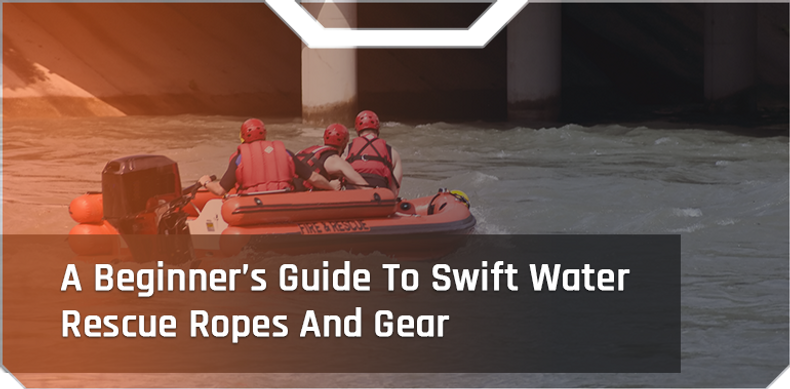What Gear is Required for Swift Water Rescue?
If you are getting ready to train for Swift Water Rescue, you are going to need a lot of gear just to get your foot in the door. We know that this can be overwhelming, so we put together a short guide on some of the essentials.
After you go through this guide, we recommend contacting any institute that may be providing your training, or an expert in water rescue.
Related: A Discussion About Swift Water Rescue
Ropes, Cords, And Straps
Swift Water Rescuers use a lot of ropes, cords, and straps on the job. If you are going to be doing Swift Water Training, you will be learning a lot about the different uses for these ropes. You will become familiar with the basic physics of mechanical advantage systems, different methods for throwing rescue line with a throw bag, and using fliplines for various applications (including correcting a raft that has flipped over).
Some Ropes, Cords & Straps Commonly Used:
- Webbing
- Short Cords For Prusiks
- Cam Straps Of Varying Lengths
- Standard Swift Water Rescue Rope
- Throw Bags & Water Rescue Throw Line
- Flip Lines With 2 Locking Gate Carabiners
What To Look For In Your Ropes
Choosing the right ropes for Swift Water Rescue is absolutely crucial for your safety, your team’s safety, and the safety of victims. Here is a short list of features that you should look into when selecting ropes.
Features To Look For In Throw Lines:
- Buoyancy
- High Visibility
- Easy Handling
- High Tensile Strength
- 24 Strand Construction For Flexibility
- A Floating Material, Such As Polypropylene
Features To Look For In Standard Swift Water Rescue Rope:
- High Visibility
- High Tensile Strength
- Very Low Water Retention
- 16 Strand Construction- Mid Level Flexibility
- Easy Handling ( Approximately ¼” Diameter)
- A Floating Cover Material, Such As Polypropylene
- High Energy Absorption In Core (Dyneema Or Similar Fiber)
Hardware
It is important that you don’t overload on hardware or other equipment, as you will need to act quickly and on your toes. However, there are some types of hardware that are absolutely essential for Swift Water Rescue.
Carabiners
Carabiners are used to terminate cords, link various aspects of rigging components, and forming other connections. You will want a good variety of carabiners with gates that lock and gates that open quickly and easily. You will particularly need locking carabiners to wrap your flip line around your waist.
Pulleys
Earlier we talked very briefly about how Swift Water Rescuers use the principles of mechanical advantages on the job frequently. Using pulley devices will be necessary for these types of applications.
If you are interested in learning about one way that mechanical advantage systems are used with rafts, we recommend this video.
Protective Wear
Water rescue is dangerous work. That should go without saying. You are going to want to invest in flashlights, a laser pointer, a first aid kit, a waterproof whistle (no ball), and of course protective gear. Here are a few items you will want to invest in.
Helmet
You are definitely going to need a helmet or two. You may want to invest in one helmet for nighttime use with an attached light. In this case, it is even more useful to get a helmet with at least two lights (one for backup). Otherwise, you will want a daytime helmet that is lighter and less high maintenance.
Wetsuit
When choosing a wetsuit, you will probably want something that fully covers your arms and legs. There are wetsuits that are specifically designed for Swift Water Rescue. A wetsuit will take more damage than a dry suit and will weigh you down less. Generally, dry suits are not seen as necessary outside of cold seasons.
Personal Flotation Device
Some water rescue folks are not fans of terms like “life vests.” Personal Flotation Devices are referred to as PFD and this is perhaps your most important piece of gear. You will be wearing your PFD all of the time, so make sure to go to a place where you can try it on. You will want to make sure it is comfortable enough to wear all day, and also test out how much it may limit your movement.
It is also recommended that you pick up a PFD with storage. You will use these features to hold your hardware, knives, zip ties, and maybe even short cords.
Summing It All Up
Swift Water Rescue is a dangerous line of work, but it also is incredibly noble. Water rescue, in general, requires an incredible level of bravery and physical ability. If you are getting into this field, you will want to make sure that you have the gear required. In addition to using this guide, we stress the importance of consulting with experienced rescuers to ensure that you have exactly what you need.





